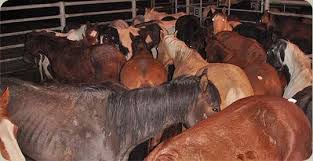The four-day weekend of horse activities was again frequented with news, discussion and controversy of horse slaughter reopening in this country.
Announcements that the United States Department of Agriculture (USDA) had approved production at horse processing plants in New Mexico and Iowa, and the possibility of additional plants opening in Missouri, Oklahoma and Tennessee, brought conflicting opinion, with extremely wide variation in news coverage as to exactly what is happening.

Initial stories indicated the openings would be almost immediately, but follow-up research reveals it might be weeks, or even months, possibly longer, before horse meat production is again a reality.
Indeed, there’s still considerable controversy about the slaughter of horses and the plant openings.
Apparently, several animal welfare groups and individuals have banded together to file suit against the federal government to stop the resumption of U.S horse slaughter.
The Humane Society of the United States, Front Range Equine Rescue, Marin Humane Society, Horses for Life Foundation, Return to Freedom and five private individuals are reported to be seeking an injunction to stop USDA-approved horse slaughter plant inspections until the court can consider the allegations in the lawsuit.
Their complaint alleges USDA did not perform required environmental impact analysis under the National Environmental Protection Act before issuing permits allowing horse slaughterhouses to operate.
USDA’s Food Safety and Inspection Service approved the first permit application, submitted by Valley Meat Company of Roswell, N.M., on June 28. A second permit was approved for a plant owned by Responsible Transportation in Sigourney, Iowa, on July 2.
Applications are also said to be being considered for horse processing plants in Gallatin and Rockville, Mo.; Washington, Okla.; and Woodbury, Tenn.
The Federal Meat Inspection Act requires inspections of plants processing horse meat to be sold for human consumption, and USDA grants these permits when applicants meet all requirements.
USDA’s decisions on these slaughterhouse permits are claimed to be at odds with recent funding decisions made by the U.S. House and Senate appropriations committees.
It is reported that both committees voted in June to halt horse slaughter inspection funding for fiscal year 2014, and supposedly next year’s proposed federal budget also does not include inspection funding.
Until these funding decisions become law, however, USDA is obligated to process and approve properly applied-for permits, sources indicate.
Slaughtering horses for meat was legal in the U.S. until 2006, when Congress stopped funding inspections of horse slaughterhouses. No inspections meant no meat processing, so the three operating slaughterhouses in Texas and Illinois had to cease operation in 2007.
In 2011, Congress restored inspection funding. Valley Meat Company and several other slaughterhouses in turn applied for permits to operate. Valley Meat was even reported to have filed suit against USDA when permit processing took too long.
U.S.-produced horse meat isn’t intended for American dinner plates, but rather would be sold overseas where it is consider it a delicacy. Zoos also purchase the meat to feed their animals.
The recent scandal in Ireland and the U.K, in which beef was mislabeled and found to contain horse meat, caused public outcry.
According to USDA studies, 92 percent of horses sold to slaughter are in “good condition,” but “they are simply unwanted.”
Statistics from USDA show that in 2012, more than 110,000 horses from the U.S. were slaughtered in Mexico. Another 60,000 horses were slaughtered in Canada.
Year-to-date totals as of March from USDA show that 21,429 horses have been processed in Mexico, and almost 4,422 have been slaughtered in Canada.